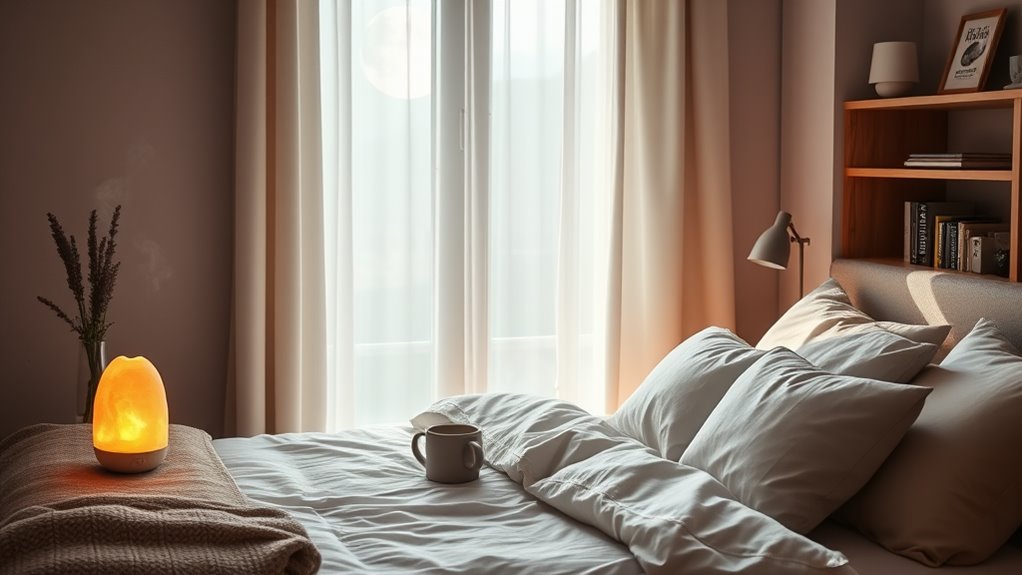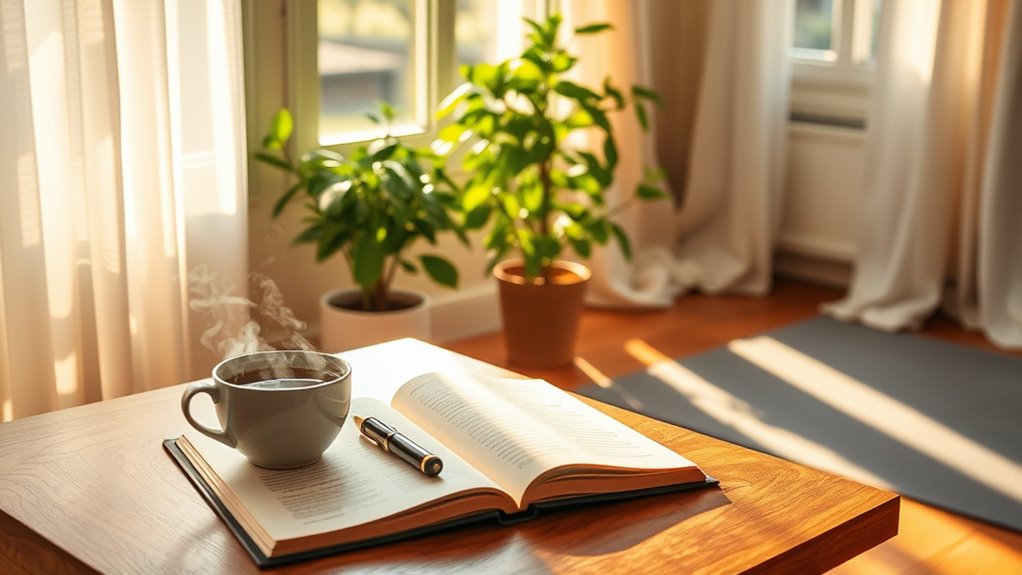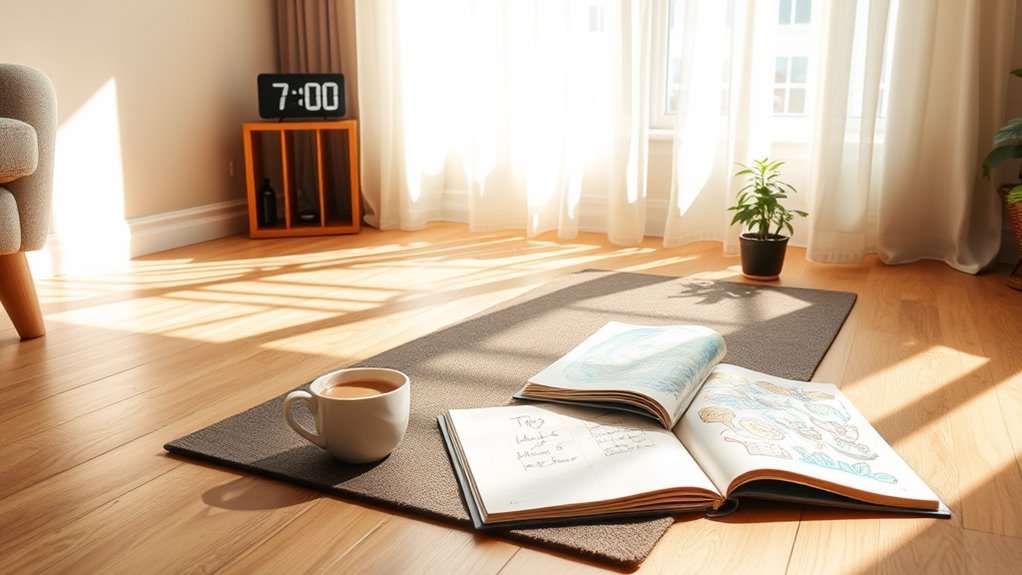The Best Tips for Sleeping Like a Pro (Even if You’re a Night Owl)
To sleep like a pro, even as a night owl, start by understanding your sleep cycle and finding a routine that works for you. Create a sleep-friendly environment with comfortable bedding and blackout curtains. Establish a consistent sleep schedule, even on weekends, and wind down with calming rituals. Manage light exposure and incorporate relaxation techniques before bed. Don’t forget the impact of mindful eating and regular exercise on your sleep quality. There’s more to discover that can help you sleep better!
Key Takeaways
- Establish a consistent sleep schedule by gradually shifting bedtime earlier, even if you’re a night owl.
- Create a calming wind-down routine with dim lights, deep breathing, or mindfulness practices to signal relaxation.
- Optimize your sleep environment using blackout curtains, a cool room temperature, and white noise machines to enhance comfort.
- Engage in regular exercise, aiming for morning or afternoon sessions to improve sleep quality without interfering with nighttime rest.
- Limit caffeine and heavy meals close to bedtime while considering soothing options like herbal teas to promote restful sleep.
Understanding Your Sleep Cycle
When you understand your sleep cycle, you can improve your overall rest and well-being. Your sleep consists of distinct stages: light sleep, deep sleep, and REM sleep. Each stage plays a critical role in rejuvenating your mind and body.
To achieve better sleep, it’s crucial to recognize how long each cycle lasts—typically about 90 minutes. By tracking your sleep patterns, you can identify when you naturally wake up and align your sleep schedule accordingly. This mastery allows you to optimize your rest and wake refreshed.
Experiment with your bedtime routine, avoiding stimulants and screens before sleep. The more you tune into your body’s rhythms, the easier it becomes to harness the power of your sleep cycle for better sleep. Additionally, prioritizing sleep as a fundamental aspect of self-care can further enhance your physical health and mental well-being.
Creating a Sleep-Friendly Environment
To sleep soundly, you need a sleep-friendly environment that promotes relaxation and comfort. Start by controlling the light; blackout curtains can help block disruptive rays. Next, consider temperature—ideally, keep your room cool, around 60-67°F (15-19°C). Finally, invest in quality bedding that supports your sleep posture. Incorporating simple nighttime rituals can further enhance your sleep quality.
| Element | Recommended Features | Impact on Sleep |
|---|---|---|
| Lighting | Blackout curtains, dim lamps | Reduces blue light exposure |
| Temperature | 60-67°F (15-19°C) | Encourages deeper sleep |
| Bedding | Supportive pillows & mattress | Reduces discomfort |
| Noise Control | White noise machines | Masks disruptive sounds |
| Aromatherapy | Lavender essential oil | Promotes relaxation |
Establishing a Consistent Sleep Schedule
Establishing a consistent sleep schedule is essential for regulating your body’s internal clock and enhancing the quality of your sleep. Aim to go to bed and wake up at the same time every day, even on weekends.
This practice strengthens your circadian rhythm, making it easier for you to fall asleep and wake up refreshed. If you’re a night owl, gradually shift your bedtime earlier by 15-30 minutes each night until you reach your desired schedule.
Avoid heavy meals, caffeine, and stimulating activities close to bedtime, as they can disrupt your sleep cycle. Consistency is key; the more regularly you stick to your schedule, the more your body will adapt, leading to better sleep and improved daytime performance. Additionally, creating a calming bedtime routine can further transform your sleep and signal to your body that it’s time to wind down.
The Importance of Wind-Down Routines
After setting a consistent sleep schedule, creating a wind-down routine can greatly enhance your ability to fall asleep. This routine helps signal your body that it’s time to relax.
Start by dimming the lights and engaging in calming activities, like reading or gentle stretching. Avoid stimulating screens and intense exercise during this time.
Consistency is key; aim to follow your routine every night to reinforce that sleep is on the horizon. You might also consider incorporating mindfulness practices or deep breathing exercises to further aid relaxation. Additionally, a 10-minute nighttime routine can effectively prepare your mind and body for restful sleep.
Managing Light Exposure
Since your body relies on natural light cues to regulate its internal clock, managing light exposure is essential for better sleep.
Begin by maximizing your exposure to natural sunlight during the day. This will help you feel more alert and energized.
As evening approaches, dim your lights and minimize screen time, since blue light can disrupt melatonin production. Consider using blackout curtains to block outside light while you sleep.
If you can’t avoid artificial light at night, wear blue light-blocking glasses. Research shows that disrupting melatonin production can lead to difficulties in falling asleep and staying asleep.
Aim for a consistent sleep schedule, even on weekends, to reinforce your body’s natural rhythms.
Utilizing Relaxation Techniques
To really wind down before bed, you can try some effective relaxation techniques.
Deep breathing exercises, guided meditation, and progressive muscle relaxation can help calm your mind and body.
Incorporating these practices into your nightly routine can make a significant difference in your sleep quality.
Deep Breathing Exercises
When you incorporate deep breathing exercises into your nightly routine, you can greatly enhance your ability to relax and drift off to sleep.
Start by finding a comfortable position, either sitting or lying down. Inhale deeply through your nose for a count of four, allowing your abdomen to expand fully. Hold your breath for a moment, then exhale slowly through your mouth for a count of six.
Repeat this cycle for several minutes, focusing solely on your breath. As you breathe, visualize tension leaving your body with each exhale. This practice not only calms your mind but also lowers your heart rate, paving the way for a peaceful night’s sleep.
Consistency is key—make it a daily ritual for maximum benefits.
Guided Meditation Practices
Building on the calming effects of deep breathing, guided meditation practices can further enhance your relaxation routine. By immersing yourself in soothing narratives, you can quiet your mind and prepare for restorative sleep.
Here’s a quick overview of effective guided meditation techniques:
| Technique | Description |
|---|---|
| Body Scan | Focus on each body part, releasing tension. |
| Visualization | Imagine a peaceful scene to induce calm. |
| Breath Awareness | Concentrate solely on your breath’s rhythm. |
| Affirmations | Repeat positive statements to foster relaxation. |
Integrate these techniques into your nightly ritual. With consistent practice, you’ll master the art of guided meditation, paving the way for deeper, more restorative sleep. Embrace this journey towards tranquility and watch your sleep quality improve.
Progressive Muscle Relaxation
Progressive Muscle Relaxation (PMR) can be a game-changer for achieving a tranquil state before sleep. By focusing on tensing and then relaxing each muscle group, you can release physical tension and calm your mind.
Start with your toes, clenching tightly for a few seconds, then let go. Work your way up through your legs, abdomen, arms, and finally your face. As you progress, concentrate on the contrast between tension and relaxation.
Incorporate deep breathing into this practice; inhale as you tense, and exhale while you release. This dual focus not only promotes physical relaxation but also helps clear your mind.
With consistent practice, PMR can become a powerful tool in your arsenal for mastering restful sleep.
Mindful Eating and Drinking Before Bed
While you might enjoy a late-night snack or drink, being mindful about what you consume before bed can greatly impact your sleep quality.
Opt for lighter options like yogurt or a handful of nuts, which provide essential nutrients without heavy digestion. Avoid caffeine and alcohol; they may seem relaxing, but they disrupt your sleep cycle. Instead, consider herbal teas or warm milk to soothe your mind and body.
Pay attention to portion sizes—overeating can lead to discomfort that hampers restful sleep. Establish a routine that signals your body it’s time to wind down, allowing your digestive system to settle.
The Role of Exercise in Sleep Quality
When it comes to improving your sleep quality, exercise plays an essential role.
You mightn’t realize that the timing and type of exercise can greatly impact how well you rest at night.
Plus, regular physical activity can reduce stress, making it easier for you to drift off.
Exercise Timing Matters
If you want to enhance your sleep quality, consider how the timing of your exercise impacts your rest. Effective exercise timing can optimize your sleep patterns and overall well-being.
Here are some tips to master your workout schedule:
-
Morning Workouts: Engaging in physical activity early boosts energy and sets a positive tone for the day.
-
Afternoon Sessions: Exercising in the afternoon can enhance alertness and reduce stress, prepping you for better sleep later.
-
Evening Exercises: If you prefer evening workouts, aim to finish at least 2-3 hours before bedtime to allow your body to wind down.
-
Consistency: Stick to a regular workout schedule to help regulate your internal clock and improve your sleep quality long-term.
Types of Exercise
Exercise plays an essential role in enhancing sleep quality, as different types of physical activity can have varying effects on your body and mind.
Aerobic exercises, like running or cycling, elevate your heart rate and boost endorphins, promoting deeper sleep. Strength training builds muscle, which can lead to improved metabolism and restorative sleep.
Yoga and stretching, on the other hand, focus on relaxation and mindfulness, helping you unwind before bedtime. High-intensity interval training (HIIT) can energize you throughout the day but may interfere with sleep if done too late.
To optimize your sleep, incorporate a mix of these exercises into your routine, tailoring intensity and timing to align with your personal sleep patterns and goals.
Stress Reduction Benefits
Engaging in regular physical activity not only strengthens your body but also acts as a powerful tool for stress reduction, which greatly influences sleep quality.
When you manage stress effectively, you pave the way for restful nights. Here’s how exercise can help:
-
Releases Endorphins: Physical activity triggers the release of feel-good hormones, enhancing your mood.
-
Regulates Sleep Patterns****: Consistent exercise helps synchronize your body’s internal clock, promoting better sleep cycles.
-
Reduces Anxiety: By lowering cortisol levels, exercise diminishes anxiety, making it easier to unwind.
-
Improves Sleep Duration: Regular workouts can increase both the quality and quantity of your sleep.
Incorporating these elements into your routine can transform your nights, allowing you to sleep like a pro.
Seeking Professional Help When Necessary
While many sleep issues can be managed with lifestyle changes and self-care strategies, there are times when seeking professional help is essential.
If you’ve tried various techniques and still struggle with insomnia, excessive daytime sleepiness, or other sleep disorders, it’s important to consult a healthcare provider. They can assess underlying medical conditions, offer tailored treatment plans, and provide access to sleep studies if necessary.
Don’t hesitate to seek help if your sleep problems persist, as chronic issues can greatly impact your overall well-being. A sleep specialist can guide you through evidence-based interventions, helping you regain control over your sleep patterns.
Frequently Asked Questions
Can Naps During the Day Affect My Nighttime Sleep Quality?
Yes, daytime naps can impact your nighttime sleep quality. If you nap too long or too late, it might make falling asleep difficult later. Keep naps short and early to maintain better nighttime rest.
What Are the Best Sleep Positions for Comfort?
Did you know that around 60% of people sleep better on their sides? To enhance comfort, try side sleeping with a pillow between your knees, or opt for back sleeping with support for your neck and spine.
How Does Caffeine Impact Sleep for Night Owls?
Caffeine disrupts your sleep patterns, making it harder to fall asleep and stay asleep. If you’re a night owl, try to limit caffeine intake in the afternoon and evening to improve your overall sleep quality.
Are There Specific Herbs or Supplements That Promote Sleep?
Certain herbs and supplements, like valerian root, chamomile, and melatonin, can promote better sleep. You’ll find they help you unwind and regulate your sleep cycle, enhancing your overall rest and recovery when used effectively.
How Can Travel Affect My Sleep Patterns?
Travel’s like a rollercoaster for your sleep patterns, tossing you through time zones and schedules. You might find it hard to settle down, so prioritize consistency and create a calming pre-sleep routine wherever you are.





